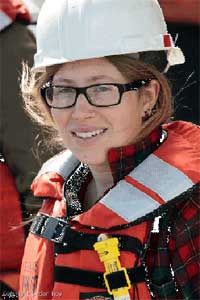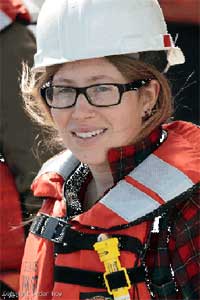 NARRAGANSETT, R.I. – April 8, 2013 – Kerry Whittaker, a doctoral student at the University of Rhode Island’s Graduate School of Oceanography, has been recognized with an award for her research at a recent scientific conference.
NARRAGANSETT, R.I. – April 8, 2013 – Kerry Whittaker, a doctoral student at the University of Rhode Island’s Graduate School of Oceanography, has been recognized with an award for her research at a recent scientific conference.
The award, presented by the Association for the Sciences of Limnology and Oceanography, is based on the clarity of her presentation, the quality of her experimental design, the clarity of her conclusions and her innovation and scientific insight. Just three percent of the 721 student research presentations at the conference were recognized by the association.
A native of Bridgewater, Mass., Whittaker studies the diversity of diatoms – single-celled marine plants – in the world’s oceans and their link to climate change.
“Diatoms are extremely diverse and remarkably successful in the worlds’ oceans, as essential links in the earth’s carbon cycle” she said. “They’re found in ecosystems from the polar regions to the tropics and from the coastal zone to the open ocean. But we don’t really understand how their diversity is distributed geographically or how different populations may be affected as the climate is altered.”
Whittaker focuses her research on one species of diatom, Thalassiosira rotula, a common and abundant species found around the world. She collected water samples across the Atlantic and Pacific Ocean basins including coastal regions off of North America, Europe, Africa, Australia, and Russia, isolated the Thalassiosira cells, and used genetic techniques to identify how closely they were related. She does this by using markers found within the DNA of diatoms that can be used to tell who’s related to whom, even if they appear to be identical under a microscope.
“We know that genetic diversity can relate to functional diversity,” said Whittaker, who earned undergraduate degrees in environmental science and English from Colby College. “By exploring how genetically and physiologically unique populations are connected over space, we can begin to understand the resiliency and adaptability of these organisms to climate change. And by looking at who is connected to whom, we can tease apart what factors contribute to their vast diversity in the ocean.”
Whittaker said that just because diatom populations may be found in close proximity to each other does not mean they are more closely related than more geographically distant populations. She has found, for instance, that individual diatoms found in Narragansett Bay may be more closely related to those collected off the coast of Japan than those collected less than 500 kilometers away from one another.
“In the ocean, geographic distance doesn’t necessarily relate to genetic relatedness” she said. “Just because they’re close together doesn’t mean they’re genetically similar.”
Once Whittaker creates a map of global diversity and inter-relatedness among diatom populations, she hopes to link her map to environmental parameters – currents, temperature, salinity, nutrient levels, etc. – to see whether those parameters are better determinants of relatedness than geography.
In the meantime, Whittaker will spend a month in May and June on a research cruise to Antarctica, where she will help to identify the species of plankton that are eaten by krill. She has about one more year at URI before completing her doctorate, after which she will be looking for postdoctoral research opportunities.
“I’m passionate about the ocean, and I love doing research, but I also want to be involved in the link between science and its societal impacts,” concluded Whittaker. “Whether or not I go strictly down the academic route or find an environmental policy path, I still don’t know. But linking science and society will be important in whatever I do in the future.”
Whittaker’s research has been funded by the National Science Foundation, via a grant to her advisor, Oceanography Professor Tatiana Rynearson.
Photo submitted by Kerry Whittaker.

